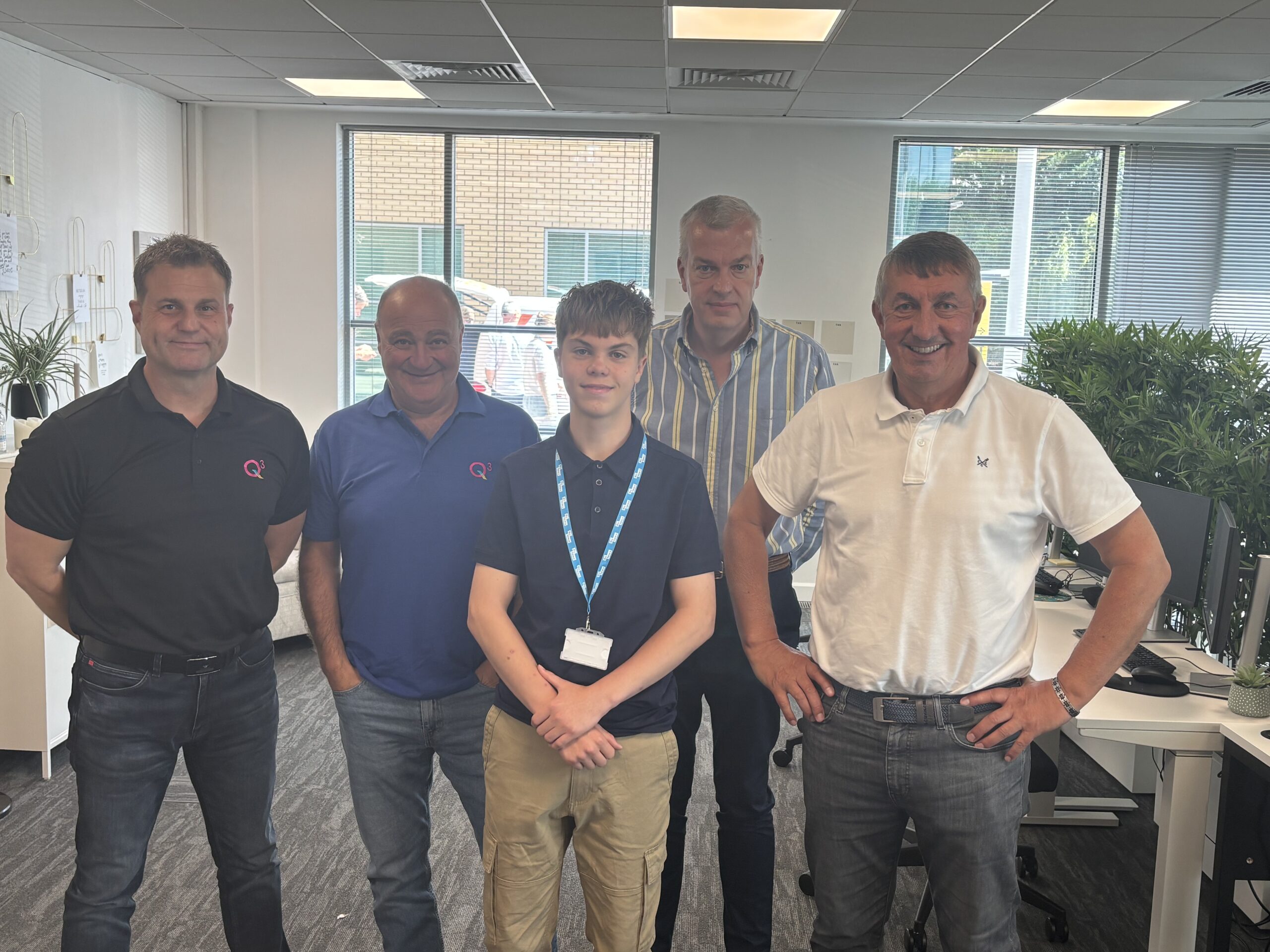A Week of Exploration and Learning
Harry, a Year 10 student from Bradley Stoke Community School, near Bristol, recently had the opportunity to participate in a work-experience programme at Q3. During a frantic but exciting week, Harry visited various key locations and met several important teams and directors, gaining invaluable insights into the world of business.
First up in Harry’s week was his visit to Chelsea Harbour, a prestigious multi-use office, retail and residential location next to the Thames. Harry gained a glimpse of life at the sharp end of a Facilities Management contract, working alongside the Q3 on-site engineers, who keep everything running smoothly 12 hours a day, seven days a week.
Another highlight was his time at the Q3 office in Theale, where Harry spent time with the finance team learning about the complex financial aspects of running a business and the intricacies involved in financial management.
He plans to pursue psychology and sociology at A level, and so Harry’s discussion with Alex Gavrilovic who heads the sales team, was of particular interest. Listening and understanding customer wants and needs is fundamental to Q3’s approach to winning business, so this was an area he found fascinating.
On the same day, Harry had the chance to meet the Board of Directors who gave him an understanding of the strategic decision-making processes that drive the company’s success. They were impressed with his inquisitive attitude commenting,
“Harry is a credit to himself and his family.”
“He prepared well and presented himself with ease.”
“Harry is intelligent and willing to learn and asked all the right questions about sales and productivity.”
An Aspiring Entrepreneur’s Perspective
Harry, who is interested in one day running his own business, found the work-experience programme to be highly beneficial and this programme provided him with a solid foundation to build upon.
When interviewed (see below) about his experience, Harry expressed the value of getting a 360o view of a business. He appreciated the strategic insights he gained, as well as the practical, hands-on experiences that allowed him to understand how a business operates from the inside.
Q&A with Harry about His Work Experience Visit to Q3
Did you do any prep for your visits?
Mainly getting questions ready. Understanding what individuals and teams do so I could ask informed questions.
What were the favourite bits of your visits to Q3?
I enjoyed all of it. It was great meeting everyone – they were all very friendly and welcoming.
Did the visits teach you about the way business runs?
I have heard my mum on business calls, but meeting everyone face-to-face brought it all to life. It was interesting to learn how operations, sales and accounts operate and are managed and how the various departments interact with each other.
I understand that you have an interest in psychology and sociology – do you think they have a role to play in business?
In business, it’s become obvious to me that it’s important to read and understand what people need instead of what they just say – particularly in a service business like facilities management. Everyone works hard to get under the skin of the client and accommodate them and deliver something they value.
What did you think about the way Q3 operates?
The people are optimistic and positive. There was a joy about the place that is quite infectious. Everyone was happy to be there and contributing as part of a team. When there is that kind of feeling about a workplace it certainly helps get results.
Was it like you thought business really works?
I didn’t really know quite what to expect, so the work experience week was an eye opener and a crash course in how a business works. I have absorbed so much this week that I woke up this morning with a headache!
How did you get on with the sales team, and what did you learn from talking to them?
Sales is not a career aspiration but, because I ultimately want to run my own business, I knew I must understand how sales works. It’s such an interesting yet critical area because without sales, you don’t have a business for very long.
What about meeting the board of directors?
The whole leadership thing is fascinating. Martyn is such a great role model, providing clear goals for the team and moulding the culture and approach to business.
I suppose it’s easy when a business is growing, successful and everyone is happy, but I get the feeling that these people know what it takes to carry people with them and turn things around should things get tough.
Has this work experience influenced your thinking on choosing a career?
No, because I am pretty sure about my ambition to run my own business. However, the work experience week has provided a fantastic insight into everything that is needed to succeed. The importance of having the right people is what has left a lasting mark.
Benefits of Work-Experience Programmes
Work-experience programmes like the one Harry participated in at Q3 are invaluable for young people looking to get into business. These programmes offer students the opportunity to:
- Gain practical experience and understand the day-to-day operations of a business
- Develop strategic insights by observing and interacting with business leaders
- Explore various career paths within the business world and identify areas of interest
- Build confidence and develop essential skills such as communication, teamwork, and problem-solving
By providing students with real-world experiences, Q3 is helping to nurture the next generation of business leaders.
These programmes not only benefit the students but also contribute to the future success and innovation of the business community as a whole.
The only challenge facing the further adoption of programmes like this is the recent trend to remote, hybrid working which means for students like Harry, it is increasingly difficult to find a time and location where organisations can get everyone together for that important face-to-face time with the students.
Harry’s week at Q3 has undoubtedly inspired him and provided him with a clearer vision of his future career path. We look forward to seeing the great things he will achieve in the world of business.
 Channel Islands
Channel Islands











